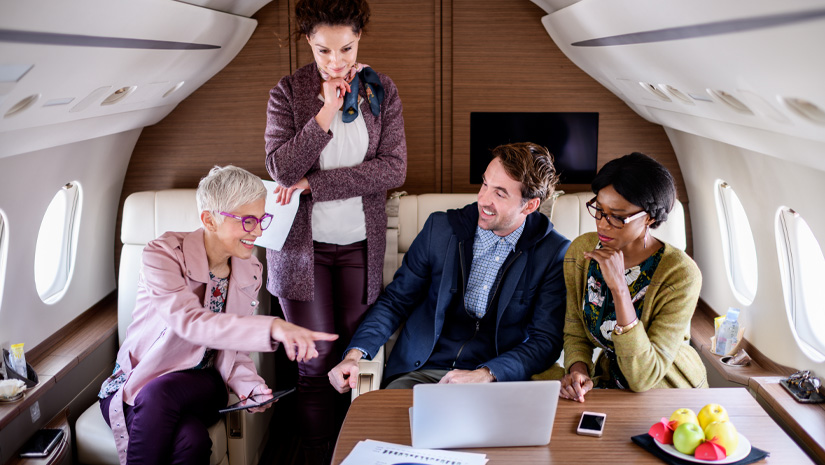
Key insights
- The IRS has announced plans to conduct dozens of audits on business aircraft. The audits will focus on large corporations and partnerships and high-income taxpayers to verify proper allocation between business and personal use.
- The use of a company aircraft must be allocated between business use and personal use. This is a complex area of tax law, and recordkeeping can be challenging.
Stay apprised of aircraft-related tax rules and much more.
The IRS is increasing scrutiny of private airplane use by companies and high net-worth individuals. It will use advanced analytics and resources from the Inflation Reduction Act to closely examine this area, which the IRS says has not been closely scrutinized during the past decade.
Discrepancies or non-compliance related to private airplane use could lead to penalties, fines, or even legal action. Learn more about the situation so you can adapt practices accordingly and comply with the latest IRS requirements.
Balancing personal use and business deductions for company aircraft
Examining corporate jet usage is part of the IRS Large Business and International campaign program, which aims to address areas with a high risk of noncompliance. The IRS will begin conducting examinations soon as part of the agency’s commitment to promoting fairness in tax administration.
Business aircraft are often used for both business and personal reasons by officers, executives, other employees, shareholders, and partners. The federal tax rules allow a business deduction for expenses of maintaining an asset, such as a corporate jet, if it’s used for business.
However, using a company aircraft must be allocated between business and personal use. This is a complex area of tax law, and recordkeeping can be challenging. For an executive using the company jet for personal travel, the amount of personal use impacts eligibility for certain business deductions. It can also result in income inclusion by the individual using the jet and could possibly impact the business’s eligibility to deduct related costs.
Steps you can take to reduce risk
By being proactive and taking these steps and others, businesspeople who use corporate jets can help mitigate risks and support compliance with tax regulations.
Start with a solid plan
Learn how to structure an aircraft ownership or lease interest. This can provide a strong and stable foundation on which to build a position for using the aircraft for business purposes. Even if you have owned and used an airplane for years, it may still help to review the ownership structure and records for areas of improvement.
Maintain accurate records
Compliance with the complex laws and regulations for the use of aircraft in business begins with detailed record-keeping. All records regarding the use of the corporate jet should be properly documented and readily available. This includes flight logs, business purposes for each trip, passenger lists, and any related expenses.
“Whether you have the latest top-of-the-line corporate jet or a small prop, the rules can make for some rough turbulence.”
Conduct internal audits
Regularly review your corporate jet use and related expenses to identify areas that may require improvement or correction. This proactive approach can help prevent potential issues before the IRS flags them.
Seek professional advice
Each individual’s situation may vary, so consider consulting a qualified tax advisor or CPA specializing in aviation and tax regulations. They can help review your practices, identify potential noncompliance issues, and provide guidance on how to address them.
How we can help
At CLA, we believe proactive, personalized planning is the key to helping you navigate tax liabilities and identify new opportunities for savings. We can help you determine the proper treatment of flights containing both business and personal aspects, along with how to account for spouses and family members accompanying the primary user on business flights.
Our knowledgeable tax professionals can provide resources you can use to help keep detailed records needed to satisfy the IRS and determine the correct income and deductions. We also offer consultation on flights for charitable purposes or the outright donation of flights.
- Depreciation (including bonus)
- Qualified business use calculation
- Standard Industry Fare Level (SIFL) calculations
- Entertainment disallowance calculations
- Personal use disallowance calculations
- Structuring ownership of aircraft
- Business grouping elections
- Passive activity considerations
- Hobby loss considerations
- Sales and use tax
Contact us
Stay apprised of aircraft-related tax rules and much more. Complete the form below to connect with CLA.
